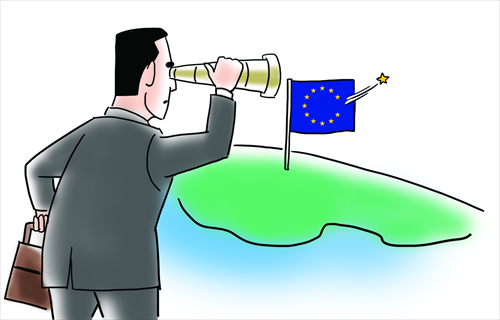Brexit to reshape future Sino-EU relations

Illustration: Liu Rui/GT
The final result of the UK's EU referendum, which was held on June 23, showed that 51.9 percent of British voters backed the country leaving the EU. Although many questions, including when London will initiate the process of withdrawing from the EU and what kind of relationship it will have with the EU in the future, are still unknown.
But once Brexit happens, it will have a significant influence on not only the UK itself, but also many other powers in the world, including China. Beijing might not suffer from Brexit as much as the EU will, but some shocks are inevitable.
China's development relies on global stability. Beijing has always considered the EU one of the major powers that maintains world peace and stability. A strong EU is without question an aid to regional and global security and development. The UK, as a member of the UN Security Council and a nuclear power, has played a crucial role in the EU.
Yet after Brexit, the country's political influence in world affairs will be weakened. In the meantime, it will trigger large-scale Euroscepticism in the short run and an outbreak of populism and panic, which in turn will lead to instability across Europe, and even the globe.
In the era of globalization, Beijing cannot be isolated from the trend, hence instability is likely to impact China as well.
Brexit is also unfavorable for China's foreign trade. China has seen total export and import volume fall 7 percent in 2015, while its bilateral trade volume with the EU declined by 7.2 percent. At the moment, the EU has not yet recovered from the economic crisis.
Once Brexit causes another round of economic slowdown or pessimistic forecasts, given that China is currently the biggest trading partner of the EU, Beijing will be bound to face more severe challenges in foreign trade.
The Sino-UK relationship will also experience certain negative influences. Foreign trade and investment have always been the most important bonds in the development of the bilateral ties. It is generally believed that Brexit will not have a major impact on trade between China and the UK. There might even be an improvement.
The European Commission has exclusive competence to forge trade deals on behalf of the bloc. Once the UK finally divorces itself from the EU, it will have to negotiate with China a new trade agreement. What the new deal will cover and how long the negotiations will last will impact both Sino-UK and Sino-European trade.
The UK is China's biggest investment destination in Europe. Thus, Chinese investment in Britain might shrink due to the devaluation of pound. Brexit has absorbed some negative impact on both the stock market and the currency market. Fluctuations will continue in the short run, and the devaluation of the pound will pile huge pressure on the yuan.
China will maintain a good relationship with the EU after Brexit. But in certain fields, ties might not go so smoothly in the future. The UK has been the strongest supporter of free trade among EU members, and especially in recent years, London has been constantly backing Beijing up - it joined the China-led Asian Infrastructure Investment Bank first, led the camp supporting China's market economy status, called for the EU to sign a bilateral investment deal or even free trade deal with Beijing, and has defended lifting the EU's arms embargo on China.
Nevertheless, after leaving the EU, the UK can no longer have any influence on the EU's China policy.
In the short term, there will be uncertainties after Britain withdraws from the EU. But no matter how UK-EU relations develop in the days to come, Beijing will maintain good cooperative ties with both sides.
The author is a research fellow at the Institute of European Studies, Chinese Academy of Social Sciences. opinion@globaltimes.com.cn. Follow us on Twitter @GTopinion